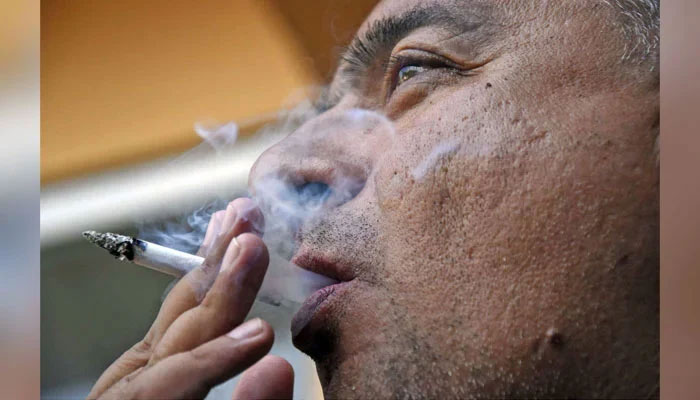Compliance with smoke-free policies is lacking
To protect the health of nonsmokers, the government passed a national tobacco control law, the Prohibition of Smoking in Enclosed Places and Protection of Non-smokers Health Ordinance in 2002. Pakistan ratified the WHO Framework Convention on Tobacco Control on November 3, 2004.
“Tobacco use is a major public health concern in Pakistan; 15.5% of the population smokes cigarettes (28.6% of men; 2.3% of women), and deaths can be attributed to tobacco-related diseases. Exposure to second-hand smoke can lead to disease and disability among nonsmokers, and death from heart disease, lower respiratory infections, asthma, and lung cancer,” says Ashiq Ali.
“Last year the Rawalpindi administration banned smoking in public places across the district and called upon all concerned to prepare plans to enforce the ban in its real spirit. The decision was a welcome step in the right direction, and, if enforced properly, could help its people,” says Fareed Hussain.
“Almost two decades later, compliance with smoke-free policies is lacking. Studies conducted in 2015 and 2018 found that compliance was lacking. Enhanced efforts by enforcement agencies and venue managers to establish 100% smoke-free public places is necessary,” adds Fareed.
“Compliance with smoke-free policies is imperative, as it protects the health of nonsmokers. Passing smoke-free legislation is not enough, proper implementation and enforcement of smoke-free legislation by public policymakers is crucial,” says Iftikhar Naqvi.
“The national law prohibits smoking in any place visited by the public, including health institutions, amusement centers, restaurants, hotels, hospitals, bus stops, educational institutions, offices, public transport, educational institutions, and sports stadiums. It also prohibits smoking in public service vehicles,” says Mazhar Abbas.
“The Ministry of Health of Pakistan issued new regulations in 2009 that rescinded a previously issued ordinance permitting the establishment of designated smoking areas (DSAs) and designated smoking rooms (DSRs) in public places, thus mandating all other public places listed in the law to be completely smoke-free,” says Rafique Haider.
“Results of the Global Adult Tobacco Survey for Pakistan (2014), found that 70% of adults who worked indoors got exposure to second-hand smoke in their workplace, as were 90% of adults who visited restaurants, and 80% of adults who used public transport. More than 25% of young people aged 13–15 years in Pakistan get exposure to second-hand smoke at home,” says Jameel Zaidi.
“Passengers light cigarettes during travel in public transport and irritate the nonsmokers. I feel irritated whenever anyone smokes on public transport. Smokers mostly look with wrinkled brows whenever they are asked to stop smoking,” says Mohsin Reza.
Sarwar Jaafri says, “The government should direct the departments concerned to ensure the implementation of the ban on smoking in public places strictly. The use of tobacco is fatal for human health. Smoking causes more than 250,000 deaths every year in Pakistan. It is a matter of concern.”
-
 King Charles Secretly Relies On Advice From THIS Royal
King Charles Secretly Relies On Advice From THIS Royal -
 Jennifer Garner Reveals Beauty Choice She Makes As Botox Alternative In Her 50s
Jennifer Garner Reveals Beauty Choice She Makes As Botox Alternative In Her 50s -
 Kate Middleton Drops Four-word Message For Young Girl After Wales Visit
Kate Middleton Drops Four-word Message For Young Girl After Wales Visit -
 Shamed Andrew Uncensored ‘massages’ Should Be Refunded To Public
Shamed Andrew Uncensored ‘massages’ Should Be Refunded To Public -
 Kylie Kelce Reveals Rules She Wants Daughter Bennett To Learn At 3: No More 'passies'
Kylie Kelce Reveals Rules She Wants Daughter Bennett To Learn At 3: No More 'passies' -
 Smartphone Market Set For Biggest-ever Decline In 2026
Smartphone Market Set For Biggest-ever Decline In 2026 -
 Mud, Rain, Loincloths: All About Japan’s 200-year-old Harvest Wrestling Ritual
Mud, Rain, Loincloths: All About Japan’s 200-year-old Harvest Wrestling Ritual -
 Jonathan Majors Set To Make Explosive Comeback To Acting After 2023 Conviction
Jonathan Majors Set To Make Explosive Comeback To Acting After 2023 Conviction -
 Next James Bond: Why Jacob Elordi May Never Get 007 Role?
Next James Bond: Why Jacob Elordi May Never Get 007 Role? -
 Maddox Drops Pitt From Surname In Credits Of Angelina Jolie’s New Film 'Couture' Despite Truce From Father's End In Legal Battle
Maddox Drops Pitt From Surname In Credits Of Angelina Jolie’s New Film 'Couture' Despite Truce From Father's End In Legal Battle -
 Meghan Markle Adds Diamonds To Engagement Ring For Jordan Trip
Meghan Markle Adds Diamonds To Engagement Ring For Jordan Trip -
 Burger King Launches AI Chatbot To Track Employee Politeness
Burger King Launches AI Chatbot To Track Employee Politeness -
 Andrew’s Woes Amid King Charles’ Cancer Battle Triggers Harry Into Action For ‘stiff Upper Lip’ Type Dad
Andrew’s Woes Amid King Charles’ Cancer Battle Triggers Harry Into Action For ‘stiff Upper Lip’ Type Dad -
 Experts Warn Andrew’s Legal Troubles In UK Could Be Far From Over
Experts Warn Andrew’s Legal Troubles In UK Could Be Far From Over -
 Teyana Taylor Reflects On Dreams Turning Into Reality Amid Major Score
Teyana Taylor Reflects On Dreams Turning Into Reality Amid Major Score -
 Jennifer Garner Drops Parenting Truth Bomb On Teens With Kylie Kelce: 'They're Amazing'
Jennifer Garner Drops Parenting Truth Bomb On Teens With Kylie Kelce: 'They're Amazing'




